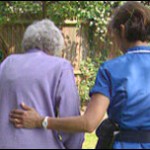 Because of soaring costs in home health care for the elderly, some relatives of individuals in late adulthood are tapping a “hidden” market: the so-called “gray market” in elderly home health care. This consists of a network of generally untrained, unscreened, unsupervised, women who are willing to work for less than the fees charged by for-profit licensed home health care agencies. According to the New York Times, the exploding population of elderly in the United States (4.2 million people are currently over the age of 85, and this number is expected to increase to almost 6 million in the next 7 years), has driven the home-care industry underground.
Because of soaring costs in home health care for the elderly, some relatives of individuals in late adulthood are tapping a “hidden” market: the so-called “gray market” in elderly home health care. This consists of a network of generally untrained, unscreened, unsupervised, women who are willing to work for less than the fees charged by for-profit licensed home health care agencies. According to the New York Times, the exploding population of elderly in the United States (4.2 million people are currently over the age of 85, and this number is expected to increase to almost 6 million in the next 7 years), has driven the home-care industry underground.
While the financial advantages are clear, there are risks involved in informally hiring someone to take care of mom or dad at the end of their lives. Without screening, a home care worker could turn out to have a criminal record or a history of abuse. Without training, the worker may not be able to respond to an emergency (although untrained workers have more latitude in responding to certain emergencies since licensed agencies may require their workers to call 911 or get approval from a supervisor before helping a client who has fallen).
Still, there are attempts to bring some order into the gray market for home care. In New York, 60,000 home care employees have been unionized and get benefits, receive support, and learn skills. There is a training program for gray-market aides at the University of Arkansas. As the number of elderly increase, and the costs of care along with it, this informal option may become of a more significant part of elderly care in the future.
For more information about the developmental issues surrounding late adulthood, see my book The Human Odyssey: Navigating the Twelve Stages of Life
This article was brought to you by Thomas Armstrong, Ph.D. and www.institute4learning.com.
Follow me on Twitter: @Dr_Armstrong



















